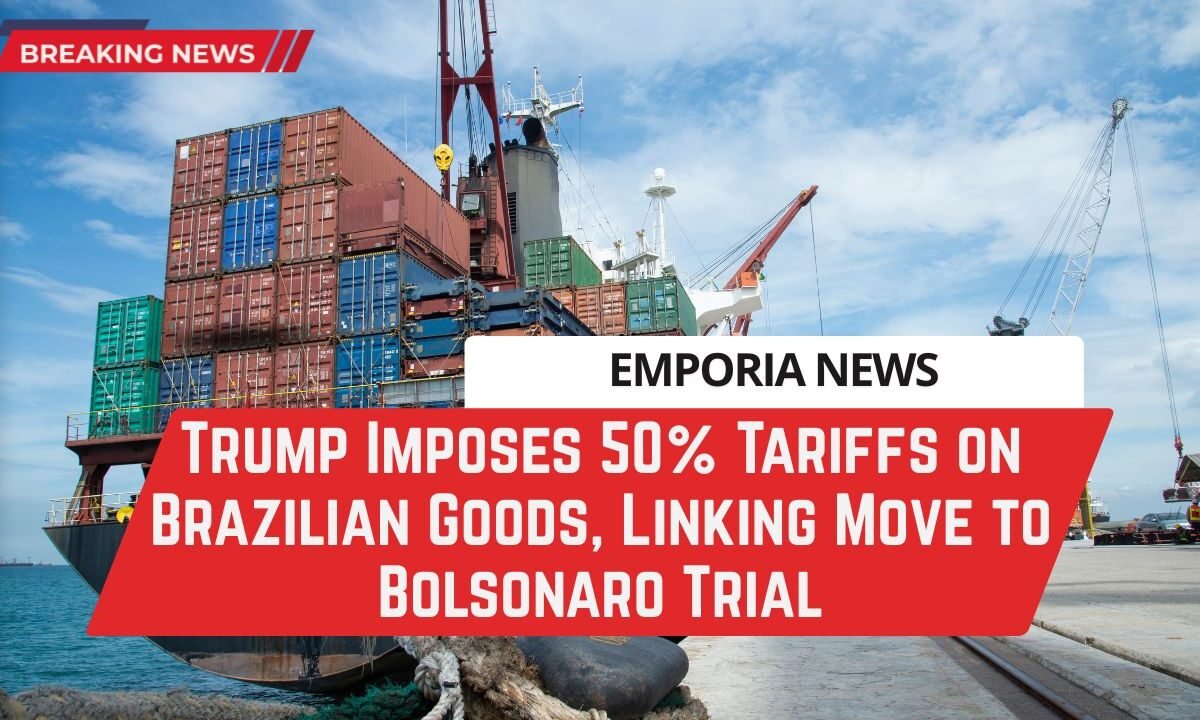President Donald Trump has announced a 50% tariff on goods imported from Brazil, directly linking the decision to what he calls a “witch hunt” trial against former Brazilian President Jair Bolsonaro.
The move signals a shift from traditional economic justifications for tariffs to motivations rooted in personal alliances and political grievances.
Unlike previous blanket tariff announcements, Trump specifically targeted Brazil due to its ongoing prosecution of Bolsonaro, who faces charges of attempting to overturn the 2022 election results.
Trump, who has maintained a close relationship with Bolsonaro, called the trial unjust and politically motivated.
“This Trial should not be taking place,” Trump posted on Truth Social. “It is a Witch Hunt that should end IMMEDIATELY!”
Brazil Pushes Back Against U.S. Sanctions
In response, Brazilian President Luiz Inácio Lula da Silva issued a strong statement condemning Trump’s actions.
Lula emphasized Brazil’s sovereignty and threatened to invoke the country’s economic reciprocity law, which could lead to the suspension of trade and investment agreements with the U.S.
Lula highlighted the fact that the U.S. has run a $410 billion trade surplus with Brazil over the past 15 years, stating, “Brazil is a sovereign country with independent institutions that will not accept being taken for granted by anyone.”
Legal Context: Bolsonaro’s Charges and Trial
Bolsonaro testified before Brazil’s Supreme Court in June regarding allegations of plotting to remain in power after his electoral defeat. Brazil’s electoral commission has already barred him from running for office until 2030.
While he hasn’t publicly commented on Trump’s tariff announcement, he claims he is being politically persecuted.
President Lula defended Brazil’s legal system, saying that the proceedings are an internal matter and not subject to external interference or political pressure from foreign leaders.
Trump Cites Free Speech Concerns and Section 301 Probe
Trump also criticized Brazil’s Supreme Court for penalizing social media companies, calling it “unlawful censorship.” He announced an investigation under Section 301 of the Trade Act of 1974, which allows for penalties against countries that unfairly hinder U.S. trade interests.
Among the companies previously fined in Brazil is X (formerly Twitter), owned by Elon Musk, a vocal Trump supporter. The fines stemmed from content moderation orders during Bolsonaro’s administration.
“In Brazil, freedom of speech is not mistaken by aggression or violent behavior,” Lula countered, emphasizing that all companies operating in Brazil must comply with local laws.
Backlash From Brazilian Lawmakers
Supporters of President Lula blamed the Bolsonaro family, including sons Eduardo and Flávio Bolsonaro, for influencing Trump’s tariff decision.
Senator Lindbergh Farias, a Lula ally, said on social media that the Bolsonaros were harming Brazil’s economy and workforce.
Tariff Escalation and Broader Implications
The 50% tariffs represent a major jump from the 10% levy Trump introduced on April 2, targeting products like oil, coffee, orange juice, iron, and steel. These duties will take effect August 1.
While Trump initially justified the tariffs using a 1977 law that allows emergency economic action due to trade imbalances, his Brazil announcement contradicts this rationale—especially since the U.S. exports more to Brazil than it imports.
More Countries Targeted With New Tariffs
In addition to Brazil, Trump sent tariff letters to seven other countries: the Philippines (20%), Brunei (25%), Moldova (25%), Algeria (30%), Libya (30%), Iraq (30%), and Sri Lanka (30%).
These nations are not major U.S. trade rivals, and their combined trade imbalance with the U.S. is relatively minor, amounting to less than $16 billion annually.
Despite global concern, Trump insisted that few countries were complaining and claimed the tariffs were “very conservative.” He added that any country retaliating with tariffs of its own would face additional sanctions.
President Trump’s imposition of tariffs on Brazil and several other nations marks a significant shift in U.S. trade policy, where personal loyalty and political alignment appear to outweigh traditional economic factors.
The decision has sparked diplomatic tensions, especially with Brazil, and reignited concerns that such tariffs could hurt global trade, strain alliances, and fuel inflation.
With the August 1 implementation date looming, how these countries respond could shape the next chapter in U.S. foreign trade policy.




